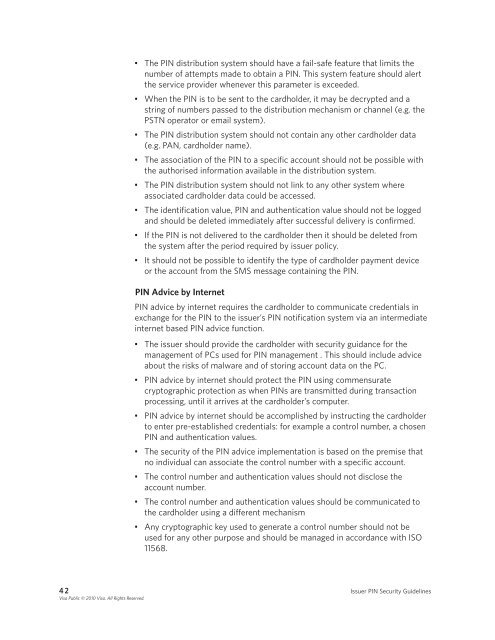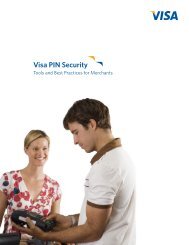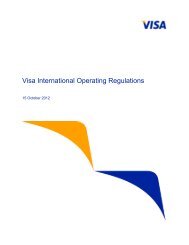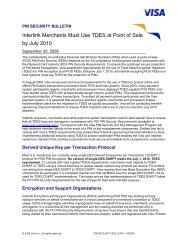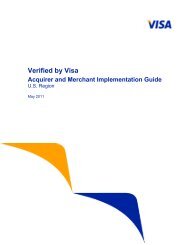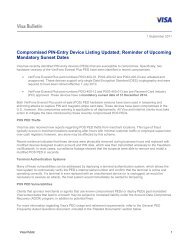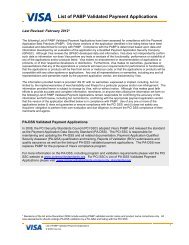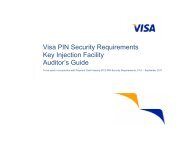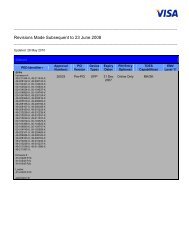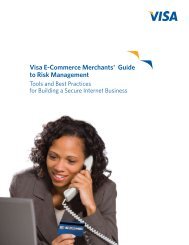Issuer PIN Security Guidelines - Visa
Issuer PIN Security Guidelines - Visa
Issuer PIN Security Guidelines - Visa
You also want an ePaper? Increase the reach of your titles
YUMPU automatically turns print PDFs into web optimized ePapers that Google loves.
• The <strong>PIN</strong> distribution system should have a fail-safe feature that limits the<br />
number of attempts made to obtain a <strong>PIN</strong> . This system feature should alert<br />
the service provider whenever this parameter is exceeded .<br />
• When the <strong>PIN</strong> is to be sent to the cardholder, it may be decrypted and a<br />
string of numbers passed to the distribution mechanism or channel (e .g . the<br />
PSTN operator or email system) .<br />
• The <strong>PIN</strong> distribution system should not contain any other cardholder data<br />
(e .g . PAN, cardholder name) .<br />
• The association of the <strong>PIN</strong> to a specific account should not be possible with<br />
the authorised information available in the distribution system .<br />
• The <strong>PIN</strong> distribution system should not link to any other system where<br />
associated cardholder data could be accessed .<br />
• The identification value, <strong>PIN</strong> and authentication value should not be logged<br />
and should be deleted immediately after successful delivery is confirmed .<br />
• If the <strong>PIN</strong> is not delivered to the cardholder then it should be deleted from<br />
the system after the period required by issuer policy .<br />
• It should not be possible to identify the type of cardholder payment device<br />
or the account from the SMS message containing the <strong>PIN</strong> .<br />
<strong>PIN</strong> Advice by Internet<br />
<strong>PIN</strong> advice by internet requires the cardholder to communicate credentials in<br />
exchange for the <strong>PIN</strong> to the issuer’s <strong>PIN</strong> notification system via an intermediate<br />
internet based <strong>PIN</strong> advice function .<br />
• The issuer should provide the cardholder with security guidance for the<br />
management of PCs used for <strong>PIN</strong> management . This should include advice<br />
about the risks of malware and of storing account data on the PC .<br />
• <strong>PIN</strong> advice by internet should protect the <strong>PIN</strong> using commensurate<br />
cryptographic protection as when <strong>PIN</strong>s are transmitted during transaction<br />
processing, until it arrives at the cardholder’s computer .<br />
• <strong>PIN</strong> advice by internet should be accomplished by instructing the cardholder<br />
to enter pre-established credentials: for example a control number, a chosen<br />
<strong>PIN</strong> and authentication values .<br />
• The security of the <strong>PIN</strong> advice implementation is based on the premise that<br />
no individual can associate the control number with a specific account .<br />
• The control number and authentication values should not disclose the<br />
account number .<br />
• The control number and authentication values should be communicated to<br />
the cardholder using a different mechanism<br />
• Any cryptographic key used to generate a control number should not be<br />
used for any other purpose and should be managed in accordance with ISO<br />
11568 .<br />
4 2 <strong>Issuer</strong> <strong>PIN</strong> <strong>Security</strong> <strong>Guidelines</strong><br />
<strong>Visa</strong> Public © 2010 <strong>Visa</strong>. All Rights Reserved.


